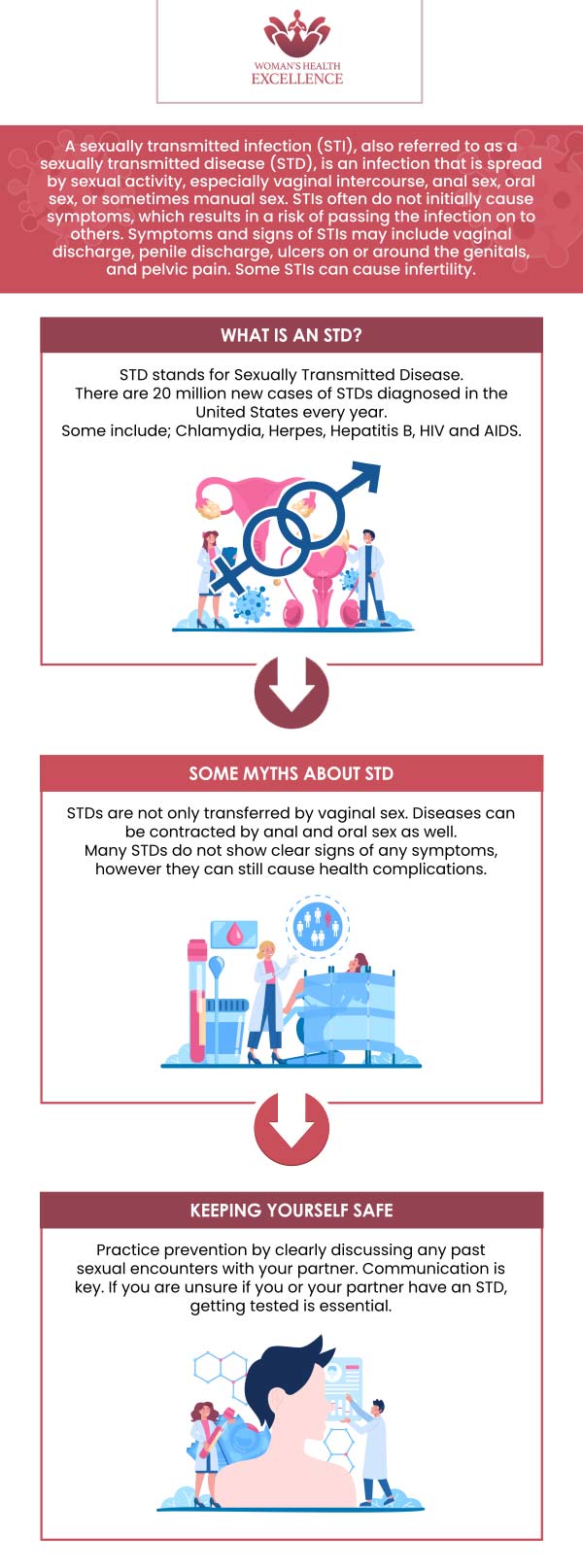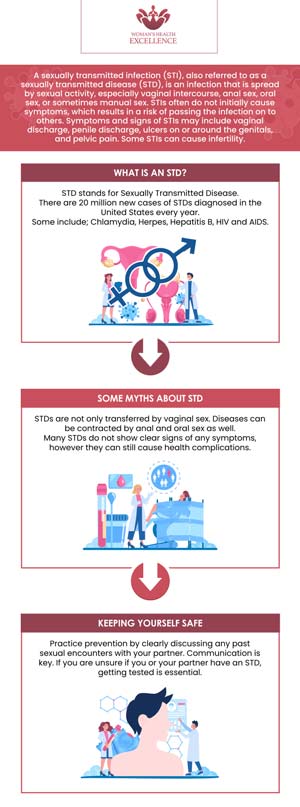Confidential STD Testing and Treatment Q&A
Dr. Prema Kothandaraman, MD, at The OB-GYN & Incontinence Center provides confidential STD/STI testing for individuals that think they may have an STD/STI and want to get tested, going into a new relationship with their partner and want to be sure of their health history, or just anyone looking to take care of themselves and others. For more information contact us today or book an appointment online. We have convenient locations to serve you in Arcadia, and Glendale, CA.


Table of Contents:
What are the types of STDs?
What are the symptoms of STDs?
How to prevent STDs?
There are many different types of infections an individual can be transmitted through sexually, the most common STI’s to be transmitted sexually include:
• Chlamydia
Many do not show symptoms of chlamydia, it is one of the most commonly reported STD among Americans though. The symptoms would do notice if you have any symptoms often include:
• Pain or discomfort during sexual intercourse or urination
• Green or yellow looking discharge from the genitals
• Pain in the lower abdomen
If left untreated chlamydia can lead to:
• Infections in the urethra, prostate gland or testicles
• Pelvic inflammatory disease
• Infertility
If pregnant women have untreated chlamydia, not only can she pass it onto her baby during birth, but the baby can develop:
• Pneumonia
• Eye infection
• Blindness
• HPV
HPV is short for human papillomavirus, which can be passed from one individual to another through sexual contact or intimate skin-to-skin. There are multiple different strains of the virus, some of the most common symptoms of HPV are warts on the genitals, mouth, or throat. Some strains may also lead to cancer including:
• Oral cancer
• Cervical cancer
• Vulvar cancer
• Penile cancer
• Rectal cancer
• Syphilis
Another bacterial infection that often goes unnoticed. The first symptom that normally appears is a small round sore. It can develop on the areas of the genitals, anus, or mouth. It is painless but very infectious, the other symptoms may include:
• Rash
• Fatigue
• Fever
• Headaches
• Joint pain
• Weight loss
• Hair loss
• Loss of vision
• Loss of hearing
• Loss of memory
• Mental illnesses
• Infections of the brain or spinal cord
• Heart disease
• Death
• HIV
HIV can cause damage to the immune system and increase the risk of contracting another virus (or many) as well as bacteria and certain cancers. If left untreated, it may lead to stage 3 HIV which is commonly known as AIDS.
Many mistakes the symptoms of HIV for the flu, the early symptoms of HIV include:
• Fever
• Chills
• Aches and pains
• Swollen lymph nodes
• Sore throat
• Headache
• Nausea
• Rashes
• Gonorrhea
This is a bacterial STI, and may also be commonly known as “the clap”. Many do not acquire symptoms with gonorrhea, but when the symptoms are present, they may include:
• White, yellow, beige or even green colored discharge from the genitalsPain or discomfort during sex or urination
• Frequent urination
• Itching around the genitals
• Sore throat
Gonorrhea must be treated, if left untreated it can lead to:
• Infections in the urethra, prostate gland or testicles
• Pelvic inflammatory disease
• Infertility
• Crabs (Pubic lice)
Tiny insects that take up residency in the pubic hair, its similar to head lice, but instead they feed on human blood. Common symptoms to look out for when it comes to crabs:
• Itching around the genitals or anus Small pink/red bumps around the genitals or anus
• Low-grade fever
• Lack of energy
• Irritability
• Trichomoniasis
Caused by a tiny protozoan organism that is easily passed from one person to another through genital contact. Not everyone develops symptoms in relation to Trichomoniasis. If you do, you may notice the following:
• Discharge from the penis or vagina Burning or itching in the genital area
• Pain or discomfort during urination or sexual intercourse
• Frequent urination
• Infections of the urethra (women only)
• Pelvic inflammatory disease (women only)
• Infertility (women only)
• Unpleasant “fishy” smell (women only)
• Herpes
Herpes is also known in short as HSV, there are two strains for the herpes virus. HSV-1 is responsible for oral herpes, also known as cold sores. HSV-2 is responsible for genital herpes. Herpes is shortened for herpes simplex virus. Herpes is one of the most common STI’s to be sexually transmitted. They are a blistery sore that is found either around the mouth or around the genitals, and usually, crust over and heal within a few weeks of outbreak. The first outbreak is usually the most painful.
• Scabies
• Chancroid
• Lymphogranuloma venereum
• Granuloma inguinale
• Molluscum contagiosum
STD’s are known as Sexually Transmitted Diseases, which are now medically known as Sexually Transmitted Infections or STI’s.
STI symptoms can be different as it depends on the STI that you are infected with, you may notice one of these common symptoms:
• Unusual discharge coming from the penis, vagina or anus
• Pain when you pee
• Lumps or skin growths that are found usually around the genitals or anus
• Rash
• Unusual vaginal bleeding
• Itchy genitals or anus
• Blisters or open sores appearing around the genitals or anus
• Warts appearing around the genitals or anus
• Warts appearing around the mouth, in the mouth or the throat (the throat symptom is quite rare)
If you notice any of the above listed common symptoms, or notice any other unusual symptoms that are not normal for you to experience, visit The OB-GYN & Incontinence Center for confidential STI testing. We provide caring and confidential testing for patients, as well as treatment options that are available for STI’s.
If you notice your partner may be showing symptoms of an STI, or you are worried due to the fact you had sex without a condom (or are continuing too), or you are pregnant and showing signs or symptoms of an STI, visit our center immediately for testing and treatment.
Many STI’s however show no symptoms including HIV. The only way to know for sure that you are STI free is to get tested regularly.
The almost 100% way of preventing contracting an STI is avoiding any sexual contact. However, even if you do have vaginal, anal or oral sex, there are ways to help prevent STI’s like:
• Properly using a condom
• Dental dams if condoms are not an option
Condoms cannot 100% prevent STI’s, as is the case if the infection is not covered by the condom, you can still contract the STI if your skin touches.
Who is at risk of catching STDs? Anyone who has sexual contact with another individual, whether it be vagina, oral or anal can become infected if they are with a partner who has an STI that is active.
Interested in our services? Contact us today! For more information call us today or book an appointment online. We have convenient locations to serve you. We serve patients from Arcadia CA, Glendale CA, Monrovia CA, Pasadena CA, Los Angeles CA, Burbank CA, and surrounding areas.


Additional Services You May Need
▸ Urogynecology
▸ Minimally Invasive Gynecology
▸ Monalisa & Medical Aesthetics
▸ Bioidentical Hormone Replacement Therapy
▸ Urinary Incontinence
▸ Pelvic Organ Prolapse
▸ Painful Bladder
▸ Urinary Tract Infection
▸ Genitourinary Syndrome of Menopause
▸ Female Sexual Dysfunction
▸ Urinary Retention
▸ Vaginal Laxity & Prolapse
▸ Postpartum Pelvic Floor Problems
▸ PCOD
▸ Bladder Prolapse Repair
▸ Urgent PC
▸ Fibroids
▸ Excessive Bleeding
▸ Pelvic Pain
▸ Birth Control & IUD
▸ Vaginal & Pelvic Infection
▸ Monalisa Touch
▸ STD
▸ TempsureVitalia
▸ Biote Pellet Therapy
▸ Topical BHRT
▸ Flexsure
▸ Rectal Prolapse Repair
▸ Tempsure ENVI
▸ Minimally Invasive Pelvic Surgery for Incontinence



